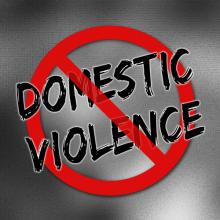intimate partner violence
Faith communities can play a powerful role in preventing violence and supporting survivors, but collectively we’re falling short. Two-thirds (65 percent) of pastors say they speak once a year or less about sexual and domestic violence, with 1 in 10 never addressing it at all. This failure has a deep and lasting impact.

Image via Josef Hanus / Shutterstock.com
It’s hard to stand in front of a congregation and talk about domestic violence.
It’s hard, because you never really know the stories of the people sitting there.
Who might have experienced domestic violence in their lives, in their home growing up, in a relationship during high school, on a college campus, in the home where they now reside?
Who might have experienced it last night? Who might have been told by their mother or religious leader that they cannot leave an abusive marriage because they would be breaking their vows? Who might have struck out at a partner? Who might have let their needs for control overwhelm their sense of self-restraint? Who might want to mask their violence with a smile or generous donations?
It's hard to stand in front of a congregation and talk about domestic violence. But it’s essential.
It’s essential because too often in the past, religious traditions have been used to defend an abusive patriarchy, to bind victims to marriage commitments that are undermined by intimate violence, to encourage people to “offer up” suffering rather than change the conditions that cause it.
It’s essential because shining a light of the reality of domestic violence is a critical step in creating pathways to safety for those who are victims. It’s essential because speaking out about domestic violence as a violation of God’s love can give victims strength to seek a better way. It’s essential because naming domestic violence as evil can help call perpetrators to account – and perhaps to repentance and treatment.
The poetic prayers, songs, and laments of the book of Psalms were recorded to teach worshipers how to praise God, as well as to lament and grieve. When undergoing times of agony or when words are not enough, the Psalms can express the painful emotions for us, as processing emotion helps us to move forward with difficult choices.
Much of the Psalms were attributed to David, including the prayer of Psalm 55—a lament about suffering violence at the hands of a loved one. Many victims of abuse find themselves alone and abandoned by family and friends who become impatient and exasperated by their ongoing struggle with loving their abuser. Praying through a Psalm may be an emotional refuge during such a painful time.

Image via Michal Plachy / Shutterstock
Intimate partner violence is a pervasive problem in our society. Moreover, while intimate partner violence affects men in addition to women, it disproportionally victimizes women. According to the Centers for Disease Control and Prevention, as many as 47.1% of women experience at least one act of psychological aggression in their lifetime. This aggression can turn physically violent: 31.5% of women experience physical violence in their lifetime, while 22.3% of women are victimized at least once by a severe act of violence. Intimate partners also perpetrate sexual violence. About 8.8% of women are raped and another 15.8% are sexually victimized by a partner in their lifetime. Finally, 9.2% of women are stalked by a partner to the point of fearing for their physical safety.
Given this reality, it is important to recognize that at any given time members of our congregations are suffering various forms of abuse. Such experiences of violence and abuse, past and present, are part of the background that inform the messages that individuals take away from Christian discussions of relationships and marriage — including reflections and sermons on Ephesians 5.

Image via victorass / Shutterstock
When it comes to the facts surrounding domestic violence (or intimate partner violence), the challenge presented in the fourth chapter of 2 Timothy remains as relevant today as it was more than 2000 years ago. In the U.S., “abundant life” competes regularly with the false prophets of violence. The terrifying rate at which women are dying at the hands of their intimate partners intersects with an entrenched American gun culture that has sold believers on the idea that more guns means more safety. In reality, women in the U.S. are 11 times more likely to be murdered with a gun than women in other high-income countries.
Over the course of October, or Domestic Violence Awareness Month, an average of five women per day—155 total—will be killed with guns. Intimate partners will comprise the majority of their killers, and too many who embrace death over life will come from Christian congregations.
The recent shooting in Oregon marks the 294th mass shooting in 2015 alone, a terrifying number in its own right and a reminder of just how far America has enmired itself in the consequences of its gun culture. More than half of all mass shootings also include the death of an intimate partner and family member.
Judges 19 is a story of intimate betrayal and the complicity of a larger community calling us to consider our own roles in our communities...The sheer horror of what this woman endured—including at the hands of husband and host—extinguishes the fires of my sanctified imagination. I can only conjure her screams. And I have no words to express them. One might look to God for a final word, but God is absent from the chapter, as this chapter and any mention of domestic violence is absent from too many pulpits.
From 2001 through 2012, 6,410 women were murdered in the United States by an intimate partner using a gun. That is more than the total number of U.S. troops killed in action during the entirety of the Iraq and Afghanistan Wars combined.
Guns are used in fatal intimate partner violence more than any other weapon. Of all the women killed by intimate partners during 2001-2012, 55 percent were killed with guns.
It is frightening to consider that within the context of violence against women, little has progressed since the time of the Old Testament. Currently, 1-in-3 U.S. women will experience intimate partner violence throughout her lifetime. Even more frightening is that every month, 46 women are killed by an intimate partner with a gun.
Americans across partisan, personal, and religious lines are divided on the role of the Second Amendment in the public square. Yet no matter ones’ stance on gun control procedures, one fact transcends opinion: women are at a higher risk for intimate partner gun violence than men.
From 2001 through 2012, 6,410 women were murdered in the United States by an intimate partner using a gun — more than the total number of U.S. troops killed in action during the entirety of the Iraq and Afghanistan wars combined. The rate at which domestic violence turns to murder is a harsh reality — and when a domestic abuser has a gun, a victim is 12 times more likely to die than when the abuser doesn’t.
I carry a purple purse. I actually bought it three years ago to treat myself to something new. Many women have complimented it, honestly to my surprise. Not that the purse is atrocious, but it does not carry a Gucci, Michael Kors, Coach, Chanel or any other label. It is just a purple purse that fits me and holds my essentials, and sometimes those of my children. Until recently I had not given any second thought to having a purse the color of Barney. Sorry I could not resist.
While reading all of the commentary about professional athletes and abuse, as if they are the only people who offend, I came across a public service announcement for the Purple Purse Campaign. What an a-ha moment. Finally someone gets it. It is one thing to give all of the stats blasting that one out of four women experience domestic violence or that twenty people per minute, men and women, are victims of physical violence at the hands of an intimate partner. It is astoundingly painful to know an estimated three women die each day because a “loved one” could not control himself. The facts are. The truth is.
However, as the Purple Purse Campaign purports, domestic violence is also withholding money or limiting financial freedom. It is verbal assault. Domestic violence is hindering access to family and social circles. Intimacy partner violence involves humiliating the victim. It is harassing people via social media, texting, phone calls or emails. Domestic violence or intimate partner violence can be a physical, mental, financial, emotional, sexual or psychological act. In other words, domestic violence is bullying.
Our shoulders touched slightly like links in a chain, kneeling around a small twin bed, our heads bowed, eyes closed: “ Our Father who art in heaven,” we mimicked, as mama kneeling at the foot of the bed, led us in prayer.
I was four, the second to the youngest child, and the other three were stair steps ahead of me. Hanging on to mama’s every word, we acted as though we didn’t take notice of the sorrow in her voice, the cries that lingered outside her bedroom door just hours ago.
Soon, she would lay in a Philadelphia hospital bed with stitches from the top of her chest down to her navel, and be told to kiss her five babies goodbye because my father had beaten her so badly that he burst both her lungs.
Decades later, I would sit across from her taking notes for Color Me Butterfly, as she told me the story:
I lay there listening to that doctor tell me that I wouldn’t make it through the night, she mused, her face drawn into the memory. I prayed, listened as God spoke to me, told me that I couldn’t let nary a soul touch me—not the doctor, the nurse, not even my own mother and chi’ren. He was gonna see to it that I walked out of that hospital, but I had to trust Him.
Now, as I think back on that day my mother stared into the abyss, as though she could still see the stitches that cinched her chest, I thank God that she was a praying woman.
When Baltimore Ravens running back Ray Rice was suspended for only two games for beating his fiancée (now wife), it became a dramatic public example of the lack of accountability for professional athletes. Only when a video came out showing Rice punching his fiancée so hard it knocked her unconscious, and then dragging her limp body from the casino elevator, did the NFL take further action. As new incidents of domestic violence and child abuse come out, many are calling for Commissioner Roger Goodell to resign or lose his job.
But this epidemic is about so much more than Goodell, whose lack of leadership is typical in professional sports. It’s about more than one team, one league, or sports in general.
Sunday night, 23-year old Kira Kazantsev proved two things when she was crowned Miss America for 2015. First, she can make a nationally television audience “happy” by using only a red plastic cup. Second, domestic violence knows no bounds.
That’s right. This year’s Miss America is one of the every four women who has experienced domestic abuse in her lifetime. During college, Kazanstev was in an abusive relationship that left her “isolated” and “hopeless,” she recently told NPR. In the same interview, Kazanstev says she wasn’t aware of the resources available for victims of domestic violence: "I very well may have Googled it," she says. "But that's not the mindset that you're in when you're in that situation. You just feel alone. You feel helpless. You don't feel like anyone could possibly understand."
Across the country, dangerous people with records of domestic violence, stalking, and aggression have no legal restriction keeping them from obtaining guns. Today, the Senate Judiciary Committee held a hearing to explore the intersection of domestic violence and gun violence. The hearing discussed major loopholes in the landmark Violence Against Women Act (VAWA), which successfully prohibited some convicted domestic abusers from gaining access to firearms. Yet even with the prohibitions in VAWA, abusers who don’t share a home with their intimate partner and abusers convicted of misdemeanor stalking charges are free to keep the weapons they have and to purchase new weapons.
“I am here today to speak for my sister Zina. I speak for Zina and her entire family because Zina is not here to speak for herself.”
Elvin Daniel, and NRA member and gun owner, lost his sister to domestic violence with a firearm and testified today in support of Sen. Amy Klobuchar’s (D-Minn.) S. 1290: Protecting Domestic Violence and Stalking Victims Act of 2013.
The tragic loss of Zina’s life is not an isolated incident. A study about the relationship between domestic violence and gun violence released by the Center for American Progress highlights how deadly this major loophole can be for thousands of women. The statistics are stunning:
- While 2.5 percent of men who are murdered are killed by a female intimate partner, 34 percent of women who are murdered are killed by a male intimate partner.
- Of all the women killed by male intimate partners from 2001-2012, 55 percent are killed with a firearm.
- More women (6,410) in the United States have been killed by a significant other with a firearm from 2001-2012 than U.S. troops have died in the wars in Iraq and Afghanistan.
I thought at first that it was a fictional scene, conflating in one example some of the problems those of us in Christianity face when confronted with issues of domestic violence. The scene was set up as a call to rethink how we articulate our theology in areas like sacrifice and forgiveness and commitment and gender roles.
Here’s what I wrote in The Capital Times in Madison, Wis., that was posted on Sunday:
“A woman has been suffering physical abuse at the hands of her husband. She finally summons up the courage to talk to her pastor about it.
“His advice: First, you need to recognize that your suffering is like Jesus’ suffering. Next, you need to forgive like Jesus forgave. Then remember that you made a commitment to marry this man for life. He is the head of your family, so you need to make sure you are doing what he wants so as not to trigger his anger.
“And then an offer: Let me meet with the two of you and help you patch up your marriage.”
I described it as a fictional scenario. And then I heard this from a friend: “that was the response from my minster regarding my first husband 30 years ago ...”
I’d like to think that many pastors these days are a least a bit wiser both theologically and practically in how they deal with someone facing domestic violence. That’s reflected in a groundbreaking survey released last week by Sojourners at The Summit: World Change Through Faith & Justice.
The women were there at the foot of Jesus’ cross.
The women were there when they laid him in the tomb.
The women walked through the desolate graveyard in the darkest hours of the night — the hours just before dawn, carrying sweet spices prepared to anoint Jesus’ dead body for proper burial. But they never got the chance.
They witnessed the earthquake, talked to the angel, and ran to the other followers announcing the resurrection of their beloved.
And Jesus’ mother, Mary, huddled in the upper room praying with the other women and the rest of the disciples in the days following the resurrection. Until that day, 50 days later, when tongues of fire fell on them all and Peter reminded the crowd of Joel’s ancient prophecy: “Your sons and daughters will prophesy.”
From the cross to the upper room, the women are lifted up! As the church stands in the light of Easter Sunday and now sets its face toward Pentecost, let us remember the women. And, as we do, let’s also remember the women in our pews and surrounding communities — the challenges, fears, and the very real dangers women face every day.
Tomorrow is Valentine’s Day, our annual reminder to celebrate the love we share in our lives. While many may be struggling through aisles of candy hearts and bunches of roses, I invite you to flip this day of mandatory public expressions of love on its head.
What if, along with romantic dinners and expensive chocolates, we celebrated those we love by committing ourselves against sexual and domestic violence? This Valentine’s Day, or V-Day, Sojourners is joining with One Billion Rising to speak out on violence against women — the most hidden injustice in our world. We speak out because one in three women will be raped or beaten in their lifetime. That’s one in three women in my family, in my circle of friends, in my workplace — and in my church.
We speak out because we want a different reality for our daughters.
We speak out because our Christian faith tells us to lift up the voices others would silence.
And we speak out because we must rally our church leaders to commit themselves to do the same.
I had a chance to play the role of Bad Pastor Phil last week.
The occasion was a conference at St. Mary’s Hospital in Madison, Wis. called “Your Congregation: A Port in the Storm for a Victim of Domestic Violence.” Bad Pastor Phil did not provide a very good port in the storm.
The group of people from some 25 parishes and congregations in the greater Madison area had just witnessed a squirm-inducing scene where Sam came home from work the day after he had hit his wife, Mary. She had prepared his favorite meal, hoping she could make him happy.
Nothing could make Sam happy, of course, other than feeling that he was totally in control of Mary. So he demeaned her, ordered her around, threw the drink of imaginary Scotch and water she had prepared for him across the room, and finally stomped out of the house.
Sam was played by Darald Hanusa of the Midwest Domestic Violence Resource Center, a social work therapist with three decades of experience treating men who batter women. Mary was played by Terry Hoffman, who earlier in the day told a gripping story of the real-life abuse she experienced at the hands of her now former husband.
So now Sam and Mary were on their way to see their pastor. We have a problem communicating, they told me. Sam said it was all Mary’s fault. Mary tried to explain that she was trying to do the best she could, but I asked her what she was doing that was pushing Sam’s anger buttons. She tried to reply, but I kept turning the conversation back to Sam.
I reminded Mary that in the New Testament of the Bible, there were two letters from Paul that said a wife should be submissive to her husband. I ignored the fear that was all over her face.
I was acting out the role that all too often churches have played in real life. Perhaps they are not as crude as I portrayed it, but getting faith-based communities to focus on domestic violence is a growing theme these days.
Violence against women is the most prevalent and the most hidden injustice in our world today. From rape as a weapon of war, to human trafficking, to the attack of a young girl seeking an education, the treatment of women and girls across the globe is in a state of crisis.
And we don't even need to leave our own shores to encounter staggering statistics. Here in the U.S., 1 in 5 women have been raped in their lifetime — a number that only jumps when you realize that 54 percent of sexual assaults are never reported. More than 1 in 3 women have experienced some kind of intimate partner violence. Sexual assaults in the U.S. military continue to rise — with an estimated 26,000 in 2012 alone — even as its leaders claim to be addressing the epidemic.
As I lay out in my book On God’s Side, what has been missing from this narrative is the condemnation of these behaviors from other men, especially men in positions of power, authority, and influence — like those in our pulpits. In a section of that book, I say we need to establish a firm principle: the abuse of women by men will no longer be tolerated by other men. The voices of more men need to join the chorus to make that perfectly clear.
It's time for all people of faith to be outraged.
A caller into a Christian radio station was telling the hosts about some of the strains in her marriage. Soon, she was talking about the physical abuse she was receiving from her husband.
And the response of the hosts of this Christian radio show? “What are you doing that is making him so mad?”
There’s a sad history in too many Christian churches of pastors telling abused wives that their duty is, as one author noted, “to trust that God would honor her action by either stopping the abuse or giving her the strength to endure it.”
I don’t think that view is as common in churches as it once was. And in many churches pastors and other faith leaders will act thoughtfully and quickly to come to the aid of a victim of abuse. But the undercurrent of tolerating abuse lingers.
A renowned theology professor from the Southern Baptist Theological Seminary, Bruce Ware, preached a few years ago that when women refuse to submit to their husbands, men will sometimes respond with abuse. He did not condone that, but he seemed to accept it as inevitable.
Yesterday, President Obama signed a reauthorization of the 2013 VAWA act. The Senate passed the bill on Feb. 12 and, the House passed the Senate bill on Feb. 28.
As President Obama signed the bill he stated, “All women deserve the right to live free from fear, that’s what today is about.”
Watch Vice President Joe Biden speak about the bill and the signing below. Read the act HERE.















